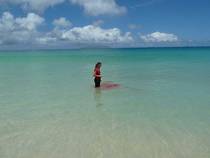
© UNESCO/ T. Mousbe
Small Island Developing States and climate change
World Environment Day is of particular relevance as we celebrate in 2014 International Year of Small Island Developing States (SIDS). These “small islands” are really “vast ocean States” whose land area is only a part of their territory and whose experience is vital for all the inhabitants of our blue planet.
The most recent report by the Intergovernmental Panel on Climate Change (IPCC) underlines the extreme vulnerability of SIDS to climate change.
The growing frequency of cyclones and coastal flooding places the inhabitants of these islands in highly precarious situations. The acidification of the ocean, combined with the increasing intrusion of saltwater into freshwater aquifers owing to rising sea levels pose significant risks for the food security of all people who depend directly on the sea for their food, affecting more than 2.6 billion people in the world.
The international community is not doing everything that it could do to prevent the environmental and human disasters that lie ahead. Our primary task is to better understand the current phenomena, through scientific research and knowledge sharing. It is the role of UNESCO, through the International Hydrological Programme (IHP), which compiles information on the aquifers of 43 SIDS, to improve strategies for managing this fragile and vital resource in the islands and in the world. The second key element is to turn this knowledge into capacity to act. The Intergovernmental Oceanographic Commission (IOC) is involved in strengthening capacities in the sustainable management of oceans and coastal areas, to help confront the threats of tsunamis, rising sea levels and ocean acidification.
In this regard, traditional knowledge is a resource of wisdom and practices that are still widely underestimated and underutilized. A joint publication of UNESCO and the United Nations University (UNU) has helped to accelerate the recognition of this immense potential, including by the IPCC, which sees in it a major resource for adaptation to climate change.
Sustainable environmental action hinges on the education of all citizens, from the earliest age, in sustainable development.
Several UNESCO programmes, such as the Sandwatch Project, aim to build the capacities of children, young people and adults to monitor and analyse changes in the coastal environment of more than 30 countries worldwide.
No single country, however powerful, can resolve the challenges of our common environment. We must act together, over the long term, as close as possible to the needs on the ground. This is the message that we must take to the Third International Conference on SIDS, scheduled for September 2014 in Samoa, which should guide the adoption of a more sustainable and equitable global development agenda.
Message from Ms Irina Bokova, Director-General of UNESCO,
on the occasion of World Environment Day, 5 June 2014
English ǀ Français ǀ Español ǀ Русский ǀ العربية ǀ 中文
UNESCO actions
-
- UNESCO & SIDS
- International Year of Small Island Developing States
- Man and the Biosphere programme
- Biosphere Reserves - learning sites for sustainable development
- United Nations Decade of Education for Sustainable Development (2005-2014)
- Sandwatch
- Climate Frontlines
- Biodiversity Initiative
- YouthXchange
Towards Sustainable Lifestyles - Intergovernmental Science-Policy Platform on Biodiversity and Ecosystems Services (IPBES)
-
UNESCO Sites in SIDS
New Biosphere reserves and World Heritage Sites will be added to the lists in June 2014.








